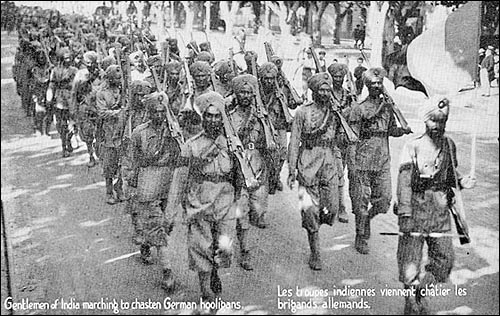We've always fought alongside allies and we must not forget that.

The rituals of Remembrance Sunday – above all the televised Cenotaph ceremony in Whitehall – offer Britain’s most evocative festival of national memory each year.
Unchanged since after the Second World War, the ceremony is a memorial to British sacrifice.
No allied representatives take part in the parade. The imperial contribution to Britain’s efforts in both world wars is scarcely acknowledged, with just a line of Commonwealth high commissioners laying wreaths.
But the ceremony symbolises Britain alone, standing alone: the underlying myth is of Britain as an exceptional country, ‘saving Europe’ and the world for freedom and democracy.
Four years’ official commemoration of the centenary of World war One has followed the same narrative.
Some generous gestures were made towards Germany. After some hesitation from the Prime Minister’s office, the German President was invited to lay wreaths at the Cenotaph and in Westminster Abbey in 2018.
But there was no attempt to recognise the enormous contribution the Indian Army made, both in Europe and across the Middle East; nor of the West India Regiment in Palestine.
Westminster Abbey ensured in its November 2018 commemoration that young people from Britain’s South Asian and Afro-Caribbean communities – many of whose grandparents or great-grandparents had served in imperial forces in one or both wars – played visible roles in the service. The Cenotaph ceremony, however, was unaltered.
The only event in the UK to mark American participation in the war was on the west coast of Islay, where two US troopships were wrecked – a ceremony unnoticed by the national media.
Suggestions that there should be some public recognition of the point at which British forces came under French command led to a small ceremony in front of the statue of Marshal Foch outside Victoria station, with two French soldiers and a Guards band.
There was no recognition of the efforts of the Belgian army, sections of which held part of the Ypres front throughout the war, with bases in England to support them.
The French approach to the centenary was far more generous to its allies and partners.
In September 2014, an open-air exhibition along the Champs Elysees displayed picture of allied and colonial forces caught up in the conflict, from English regiments and Scots Highlanders to Sikh infantry, Moroccans and Algerians.
President Trump was invited to attend the march-past of US forces in Paris that ceremoniously marked the centenary of American entry to the war. British contingents were also invited to march down the Champs Elysees to commemorate our role on the Western front.
We never stood alone, either in the First or the Second World War. Even in the Battle of Britain, Poles, Belgians and Czechs played significant roles, alongside Australians, South Africans and New Zealanders.
The Polish role in World War Two from their intelligence contributions in 1939 to the Polish divisions in the 8th Army – has been scrubbed out of our national history.
The British forces that invaded Normandy in 1944, alongside a larger American contingent and a Canadian corps, included Free French divisions, a Czech brigade, and ships crewed by Dutch and Belgian sailors.
The myth that ‘we beat Germany in two world wars’ on our own, feeds into complaints from eccentric Tory backbench MPs that ‘now the Germans are telling us what to do’.
I have heard that sentiment on doorsteps countless times. Sadly, our rituals of national memory reinforce that myth, rather than educating our citizens about the wider alliances on which we relied.
A visible Indian presence at a future Cenotaph ceremony, an American, French or Polish contingent as part of our remembrance, would tell our younger generation that we fought for our values alongside others, not as an exceptional nation on our own.
National rituals matter; they feed into popular assumptions about our national identity and our place in the world.
William Wallace is a Liberal Democrat member of the House of Lords and a former member of the government’s advisory board for the commemoration of World War One




8 Responses to “Our Rememberance rituals should recognise our allies more”
Joe
The left are so anti-British !
The left should be celebrating the defeat of the nasty jew-hating nazis.
Oh wait a mo …
Tom Sacold
Never forget that the greatest sacrifice in WW2 was made in eastern Europe.
It was the forces of socialism that eventually destroyed the fascists.
Sue and Norm Visser
This article is headed in the right direction but there’s still room for much improvement. Obviously William Wallace isn’t aware of the much larger contribution that Canada played….not just “a Canadian corps”!! This would be a good start to learning more: https://www.historians.org/about-aha-and-membership/aha-history-and-archives/gi-roundtable-series/pamphlets/em-47-canada-our-oldest-good-neighbor-(1946)/what-was-canadas-role-in-world-war-ii
Sue and Norm Visser
And another site: https://en.wikipedia.org/wiki/Military_history_of_Canada_during_World_War_II
Barry Edwards
Good piece. With hindsight A number of ideas come into mind. Jeremy Deller’s ‘We’re here because we’re here’ could have been expanded to include more overseas troops. Troops in period uniforms could have marched in the Centenary of 1918 Parade last year.
Still time to do something similar to mark the 75th Anniversary of the end of WW2 next year.
P.S. Here in Islington we have an Inter-Faith Service and our community with its worldwide roots does help to remind us of those multinational forces the came together.